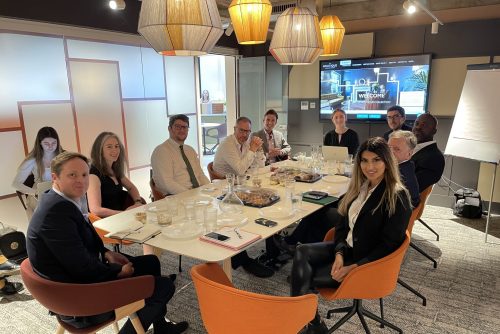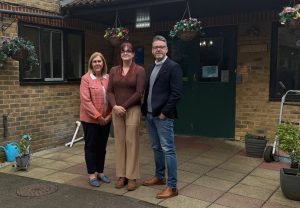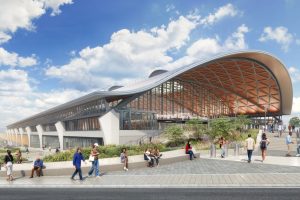Round table report – the demand for quality land

An insightful roundtable discussing employment land and other property issues was held last week (5th July) sponsored by Siddall Jones.
A panel of property experts joined our business reporter Anna Cooper, to give their expertise on how the demand for quality land can be maintained and following the Commonwealth Games, how the region can put its best foot forward to entice further investment.
Ed Siddall-Jones, managing director of agency Siddall Jones said: “We have needed industrial stock for clients and tenants for a while, but the council needs to help with freeing up enough quality land for employment purposes.
“If there is available land, it is used for residential developments, leaving a huge shortage. On top of that, going through planning permission is incredibly slow”.
Agreeing with Siddall-Jones, Alasdair Thorne, principal planner at Marrons Planning said: “How slow planning is, is a huge issue. It can take five years to produce a local plan for the various stages. But then it’s all politically driven effectively, and a lot of what’s talked about is all regarding residential numbers.
Andrew Round, senior director of economic development at CBRE said the current planning system in place is not good at helping find employment land, but land itself is getting “eaten into by competing uses”.
He said: “All sorts of places, not just Birmingham, are lacking the understanding that we need to provide more local and smaller scale floor space. This is difficult in terms of planning but on the other hand, it’s getting eaten into because the planning system is shifting things from employment to residential”.
Ed Siddall-Jones: “Currently, the value for industrial developments are actually the same as residential, which is bonkers. But it just shows you that that demand is there but we’re not seeing any smaller schemes coming through”.
As land increases in price, landowners expectations also rise. John Harper of Hannafin Contractors said: “We have been looking at an employment land opportunity, which would have been for smaller employment sheds.
“But part of the issue we’re now finding is the landowners expectations, because some of the figures that get passed around to landowners will be with planning, where at the moment, they are just sitting on what’s sometimes even Greenbelt land.
“I think the percentage of vacant employment space is something around 2%, which is the lowest it has ever been. So the demand and the requirement for it is there, we just need to unlock it”.
Commercial development director for Godwin Developments Claudine Tracey, who works on roadside retail and grocery projects said: “From a developer’s perspective, I think in order to bring in more readily available land, and more investment into Birmingham, the council should be more open to providing a longer term vision.
“We have the city plan but developers need to know the aims for the next 20 years. It would be useful for land to be released around Smithfield for example, for some smaller developments with local developers. And that way, we’re bringing more people into that area and more investment into Birmingham”.
With working patterns shifting to become more flexible, many companies across the region have had to rethink their spaces for today’s workforce and focus on providing attractive amenities whilst meeting sustainability targets.
Commercial director at Centrick Alex Tross said, “People are thinking if I’m going to enjoy the commute, and spend a million pounds a litre on diesel to get to my office, what is it the end of that torturous journey? Following the 2012 Olympics with Chris Hoy it became about bike storage and showers. Now it’s about roof terraces, great WiFi and sustainability. It’s being referred to as the hotelification of offices”.
“The more interesting story where we Centrick are more active, is the Grade B refurbishment projects. The bulk of Birmingham’s office transactions are sub 10,000 square feet, most are actually 5,000 square feet. And that’s what drives the activity”.
Beth Margetson, commercial property partner at mfg Solicitors, is seeing a lack of engagement between the local authorities and stakeholders, which delays projects such as the redevelopment of Digbeth.
On top of that, collaborative efforts such as the Big City Plan require constant updating.
She said: “The big city plan was released in 2007, which was a 20 year plan for Birmingham, that’s kind of out of date now. Covid has now moved our thinking along, and certainly when you look at the Rae Valley Urban Quarter – historically that is a lot of employment land there. But supplementary planning guidance talks about mixed uses, but what’s coming through is mostly residential.
“There isn’t that recognition that we need to look at last mile distribution, perhaps dark kitchens as people are moving more towards takeaway and eating out culture – none of those kinds of trends existed when they were looking at the Big City Plan in 2007”.
Property technology providers Nimbus Maps are using tech to streamline the process of finding quality land opportunities, helping projects become more dynamic.
Co-founder Simon Davis said: “The bit that’s missing in this property industry is the silos and the lack of transparency. Everything you look at is backwards, as you’re looking at transactions two years ago. Today, the biggest fear of recession is if we look at what’s happened over the last two years and go, well what’s going to happen tomorrow? Because all the data is out of date”.
Talk turned to how can the city put itself in the best position to entice further investment and strengthen the economy off the back of the Commonwealth Games.
As Bruntwood was the official commercial property development provider for the Games, Rob Valentine director of Birmingham for Bruntwood Works said the region has “started to see ourselves as a global city.
“We want to place ourselves as a global city, but it takes that ambition, doesn’t it? So it’s incumbent on all of us now to think about having global relevance and to drive inclusion. Inclusion and diversity will be part of our success”.
Bruntwood’s part in developing the Knowledge Quarter will also help drive the regeneration of Birmingham’s Eastside, hoping to stretch the city to improve connectivity.
Valentine said: “It’s about collaboration between the universities, landowners, ourselves and the city to deliver an innovation district that’s world class. Birmingham doesn’t have that just yet. It’s something that should have already happened.
“It’s also an opportunity to reach out into places like Nechells, which is one of the most deprived parts of Birmingham and start engaging with the community there and offering opportunities”.
Concluding the morning, Ed Siddall-Jones echoed the excitement of the region and said: “With the Commonwealth Games and HS2, there is such a buzz in the region!
“It would be great to carry this momentum with holding the Eurovision – I remember it being here in 1998! We need to replicate the success of these events by holding a large event each year, something that will hit the global headlines.
“In Birmingham, it’s the right time and the right place to do it. It’s an exciting time”.








